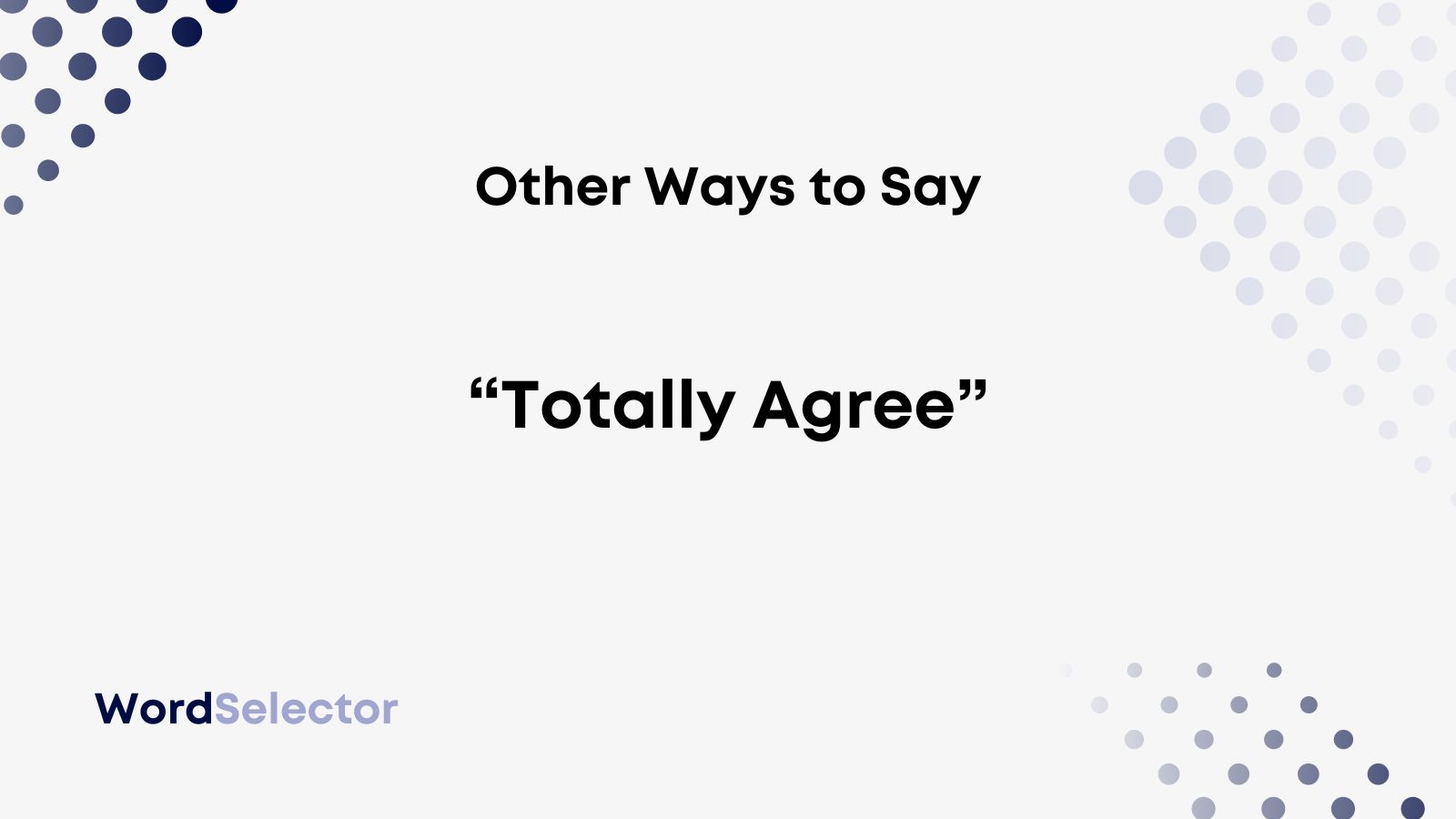Have you found that you’re using the phrase “totally agree” too much and are now looking for some synonyms to help diversify your language?
Then you’ve come to exactly the right place! We have 15 alternative options right below and we’ve selected some of our favorites.
Other Ways to Say “Totally Agree”
- Concur
- That’s for sure
- Wholeheartedly agree
- Completely agree
- 100% agree
- Couldn’t agree more
- Absolutely
- Exactly
- No doubt about it
- That’s so true
- We’re in accord
- We are of one mind
- You took the words right out of my mouth
- Couldn’t have said it any better
- Hit the nail on the head
KEY TAKEAWAYS
- Firstly, “totally agree” is a grammatically correct phrase that’s informal but appropriate to use in a professional environment.
- Secondly, if you’re looking for a more formal alternative, you can try using “concur.”
- Lastly, when you need an informal alternative, try using “that’s for sure.”
If you keep reading, we’ll explain in more detail the scenarios in which you might want to use these formal and informal options. Additionally, we’ve provided some example sentences so that you can see how they work in context.
Finally, we’ll explain more about what the original phrase means.
Concur (Formal)
If you’re looking for another word for “totally agree,” try using “concur.”
This is just a formal term that means to agree with something. It has a slightly elevated register, which means it’s perfect to use in scenarios where you’re trying to impress someone with your vocabulary.
Additionally, you can use it in situations where a particularly formal tone is required, perhaps when meeting fancy new clients.
The phrase “totally agree” is more informal, so you probably won’t want to use it when you feel like it’s important to maintain a reserved and not-friendly tone. However, it’s still polite and you can use it in a professional environment.
Here’s an example of how you can use this synonym in an email:
Dear Elizabeth,
I concur with your theory about why sales figures have been dropping.
Let’s meet in person tomorrow and try to work on some solutions.
Kind regards,
Lucy
That’s for Sure (Informal)
An informal alternative to “totally agree” is “that’s for sure.”
As this is an informal option, you won’t want to use it in scenarios where you feel like an elevated tone of vocabulary is required, such as when you’re making an important presentation at work.
However, it’s still a polite phrase so it’s appropriate to use in a professional setting if you’re interacting with co-workers with whom you normally adopt a more relaxed tone.
Here are some examples of how it works in a sentence:
Person 1: We really need more support if we’re going to make these deadlines.
Person 2: That’s for sure!
We’ll be out of business in months if we don’t secure this contract, that’s for sure.
Is It Correct to Say “Totally Agree”?
“Totally agree” is a grammatically correct phrase that you can use to show that you support what someone is saying.
Here are some examples of how you can use it in a sentence:
- I totally agree with you about our social media strategy – it’s rubbish!
- When it comes to finance, I totally agree with him. On a personal level, I despise him.
You can also use “agreed” as the past tense form of the verb, e.g.:
- We totally agreed on that once, but our opinions are different now.
However, the term “agreed” is also an adjective which means that something has been accepted, like in the below example:
- So those terms are now totally agreed upon.
Finally, you can use “totally agree” or “totally agreed” as a complete statement, especially colloquially:
- Person 1: These candidates are the strongest we’ve seen in a while.
- Person 2: Totally agree.
- Person 1: I don’t think this legislation does enough to protect low-income families at present.
- Person 2: Totally agreed.
Although “totally agree“ is used more frequently, both are correct as complete statements. While “totally agree” tends to be a shortened form of “I totally agree,” “totally agreed” is short for “we are totally agreed on this.” As such, they can be used interchangeably.
However, to use these phrases in this shortened way is best suited for informal situations, or when speaking to colleagues in the workplace with whom you have a close relationship.
Now, you should know how to say “totally agree” professionally in a variety of ways. If you found this article useful and would like to return to these synonyms, why not make it easy by bookmarking this page?

